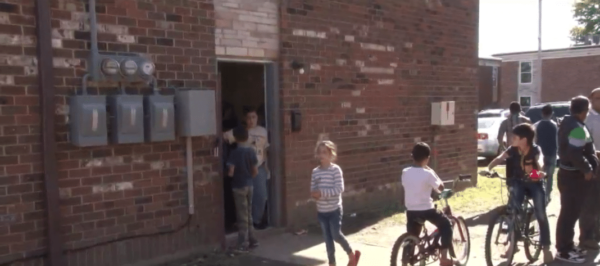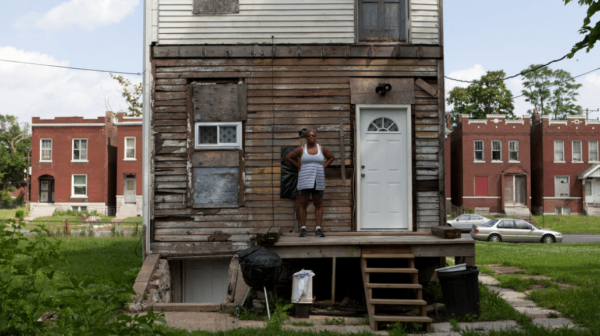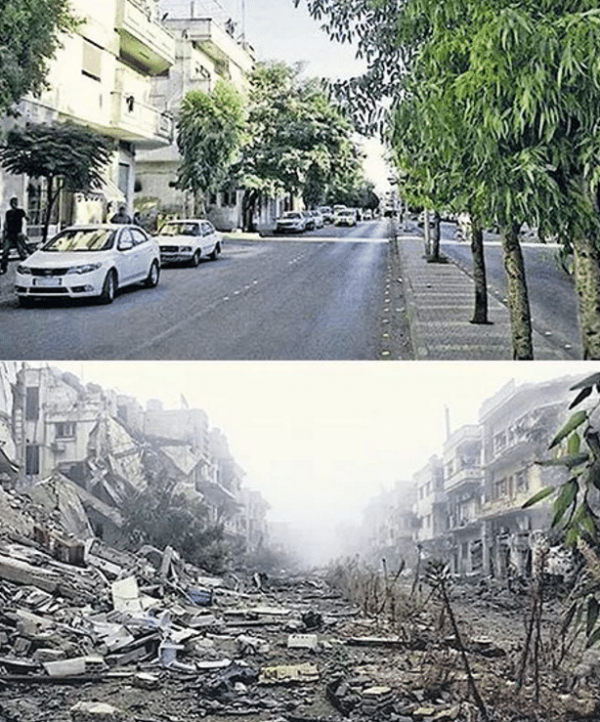
Syrian children playing in an apartment complex on Hodiamont Av. in St. Louis, MO Credit: ksdk.com
St. Louis’ Northwest side, particularly Hodiamont Avenue has found itself at the center of controversy yet again, as it has garnered a reputation for poverty and crime over the years and deemed a war zone of its own by many natives of St. Louis.
Just last year, 16-year-old Brandon Claxton was shot and left paralyzed by police, which resulted in coverage of a Hodiamont Avenue apartment complex where many residents feel trapped with no way out.
And as of this week, Syrian refugees living in another apartment complex on Hodiamont Avenue are not at all pleased about their living conditions. The newly resettled Syrians report high crime, bug infestation, and an array of other issues.
As a result, many things have come into question regarding both Syrian refugees as well as lingering issues that have plagued African-Americans for generations in St. Louis.

A northwest St. Louis resident stands on her porch. Credit: The New York Times
According to an article published by CBS St. Louis this week, refugees are warning their loved ones back home to avoid coming to St. Louis at all costs. They even claim that refugee camps in their war-torn homeland are much more livable than St. Louis’ northwest side.
There are some who claim that this outcry by Syrian refugees and almost immediate response by local politicians is nothing more them exercising their “POC privilege” and serves as more unrelenting proof that African Americans are purposely marginalized and forgotten.
A very vocal St. Louis Activist, Nyota Uhura said via her Facebook page:
“North St. Louis County’s is so bad refugees fleeing from war torn Syria are warning friends not to come.
Yet this is the same blight, neglect and urban warzone black citizens have been forced to endure as a result of bad policies, unaccredited schools, lack of opportunity and not being protected or served.”
St. Louis Pastor and community leader Traci Blackmon wrote about the issue via her Facebook page:
“This is infuriating. Not only for the lived reality of these Syrians, but even more so for the suggestion that as they integrate into St. Louis, they will be able to move on to a better living environment.
With absolutely no acknowledgment that these are also the living conditions of black families who are not going anywhere. Why not put resources into these neighborhoods so everyone can thrive…instead of promising refugees they won’t have to stay long? Or better yet….move them all to Ball Park Village!!!!”
Facebook user Nicole Hudson also posted in response:
“This article is a perfect synthesis of how our region is comfortable and intentional about prioritizing the well-being of our immigrant population but complacent and blatantly ignores our black population. Super supportive of immigrants and St. Louis support of immigration and livid that St. Louis is not embarrassed to publicly flaunt how little it cares about its black population.”
There are also responses from other social media users ridiculing the refugees for their complaints insinuating that they should be grateful to be anywhere but Syria. To be fair, prior to the Syrian uprising in 2011 — which many suggest the U.S instigated — the nation’s leading cities, such as Aleppo, were not only metropolitan comparable to populous cities in the U.S.
Damascus, formerly one of Syria’s most promising and ancient cities, for example, was “a place where you could walk the streets with your girlfriend or grab a beer without a second thought,” said Alaa Alderie, a former Syrian banker who is now a refugee and St. Louis resident.
This article published by The Guardian shows the contrasting before and afters as pictured below.

Credit: The Guardian
As a result of the conflicts, Syrians have been resettled in St. Louis thanks to an initiative called “Bring Them Here.” But according to Syrians themselves, the U.S. isn’t as welcoming as they’ve imagined.
St. Louis alderman Jeffery Boyd, assigned to the 22nd Ward where the housing complex is located, didn’t offer much relief but says:
“I hear it far too often myself, my family is tired of hearing it. [Also] some of the new refugees are leaving their doors open and they have food on the floor, maybe crumbs whatsoever.
If you leave your door open out in an area where there’s field mice potentially, then they’ll be in your house before you know it”
He also admitted that he received a financial contribution from its landlord but that his views on the residents’ living conditions are unaffected by the contribution. Boyd has also been called “questionable” and has previously come under fire during his tenure.
In poor attempts to make sense of the deplorable conditions of both Syrian refugees and Black residents, St. Louis reporter Jason Aubry says:
“They have the same problems anyone else would have, including children who seem unintentionally determined to find ways to get into trouble.
Ultimately, these refugees are like a lot of us who have been here for generations; just struggling to get by.
And while gunfire can be a common nighttime sound, at least they have found a place where rockets and mortars and bombs are not exploding. They have traded those dangers for our brand of first-world-problems plaguing renters all over the country, like bed bugs, and other pests.”
But will Syrian refugees and Black residents on the north side of St. Louis get the help they need?
For the refugees, Suzanne LeLaurin, a representative of International Institute of St. Louis, vows to meet with city police to possibly get more off-duty police patrols in the area. She also suggested the refugees focus on learning English, getting a job, buying a car and enrolling their children in local school.
The International Institute has also announced plans to meet with the landlord of the apartment complex on behalf of the refugees.
But for the Black residents, besides vocal community activists and residents, municipal leaders have largely remained silent.


